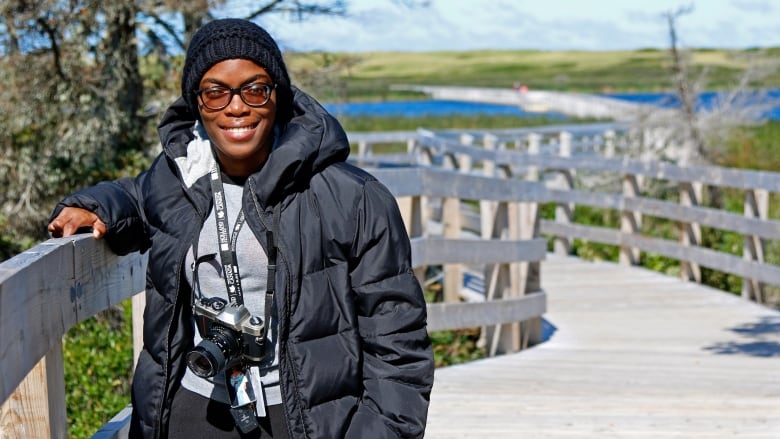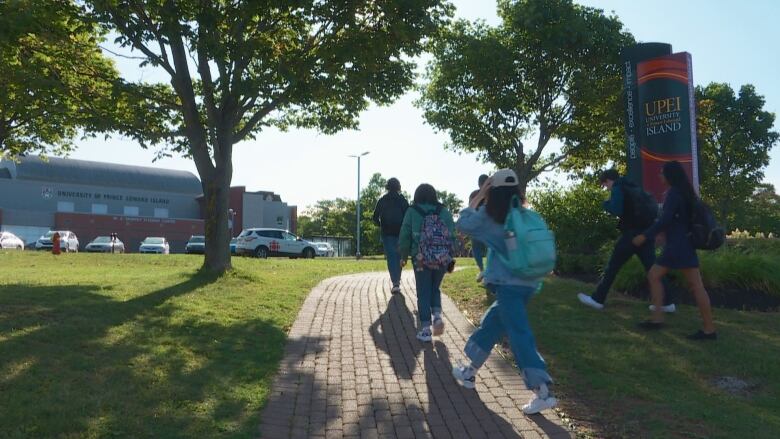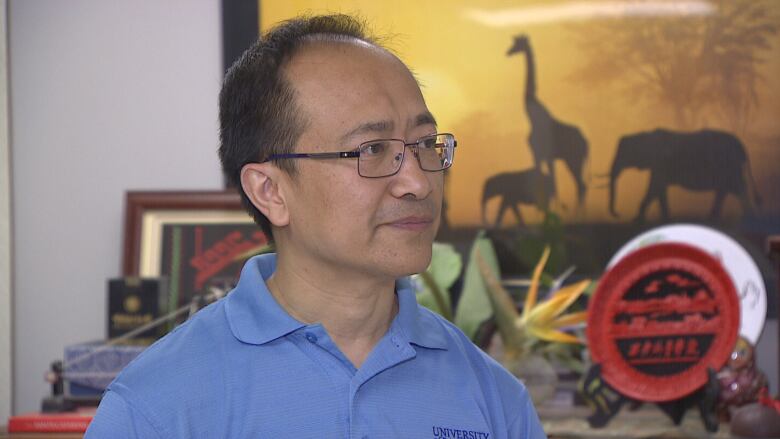Far from home, some international students facing financial difficulties
'In the back of my head I'm kind of like, I'm kind of stuck here, not knowing what's next'

Desmona Bootle was supposed to walk across the stage in hergraduation ceremony laterthis May, but like many students in P.E.I.,that wasput on hold due to COVID-19.
Bootle, 20, is an international student at Holland College, who moved to P.E.I. last August to study photography and videography.
As an international student, the pandemic has introduceda number of setbacks, anda delayed graduation ceremony is likelythe least of them for Bootle.
'Things are kind of tight and tough'
Bootle is Bahamian and grew up on Crooked Island.
She said her familysurvived the devastating impacts of Hurricane Dorian a storm that hit the Bahamian Islandslast September and killed 76 people.
"Family is doing pretty well. They are trying to get back up on their feet even though they are doing thebest they can," she said.
"COVID-19 put a setback to them."

Prior to COVID-19, Bootle's parents were sending her money each month, but now they are unable to work due to the pandemic, and that's made her financial situationcomplicated.
"To be honest, things are kind of tight and tough," she said.
"I'm having difficulty trying to find a job so I can provide for my own, rather than depending on my parents all the time."
She said with the money she does receive, she's careful how she spends it, using the majority of it for groceries.
Some of our young people didn't have a placeto go home when the virus came.- Sandy MacDonald, president of Holland College
Bootle said it's hard to imagine what her future will look like, especially whenshe's so far from home.
"In the back of my head I'm kind of like, I'm kind of stuck here, not knowing what's next or what to do, or how to feel."
There are federalprograms available to students such as the Canada Emergency Response Benefit and the Canada Emergency Student Benefit, but some international students, like Bootle aren't eligible for these programs.
Ottawa expanded program
In an email to CBC,Marielle Hossack, the press secretary forMinister of Employment and Workforce DevelopmentCarla Qualtrough, said "Ourgovernment values the important contributions international students make to communities across Canada.We recognize the challenges that they might be facing during this global pandemic and have taken action to support them."
She said the federal government "introduced flexibilities to allow international students to work more hours while studying, from 20 to 40 hours in essential serviceswhich allows them to earn more revenue during these especially difficult times."
Because Bootle moved to P.E.I. last year and was not employed, she does not qualify forCERB. She also does not qualify for the CESB because she is not a Canadian citizen or a permanent resident.

Sandy MacDonald, the president of Holland College, said the College has heard similar stories from other international students, especially those from the Bahamas.
"If there was a group that we were concerned about it was probably some of our Bahamian students, not all of them, but some of them they had a significant hurricane in the fall that some of our young people didn't have a placeto go home when the virus came," he said.
"Others, depending on financial support from their parents, that financial support was not forthcoming because the parents had lost their employment to the hurricane. So we knew that some of our students were in a worse situation, let's say a more precarious situation than others."
MacDonald said HollandCollege is supporting international students financially with various funding programs to help with things such asliving expenses.
He said the institution is also trying tofind students work and organize travel if they're looking to go home for the summer.
Bootle said she's applied for funding at theschool and said it's been very supportive.
"I am grateful that the college always reaches out to us to try and assist us in any ways they can," she said.
In an email to CBC, Holland College said itreceived 117 applications for funding as of April 27,and payments will bemailed to students this week.
Food bank busy
Jerry Wang, thedirector of international student services office at the University of Prince Edward Island, said the universityrecognizes the unique challenges international students are facing and is doing its best to help.
"We want to make sure everybody stays well, is safe and also very healthy," he said.
"We understand the anxieties that are on people's minds."
Wang said UPEI is also providing various financial supports, including a $70,000 fund for students called the Student Adversity Awards.
More than 200 international students applied for it, which he said surprised him.
"We want to support as many students as possible, but we look at who needs the financial assistance the most."
He said the university community has stepped up in other ways as well, with many donating food to the chaplaincy food bank.
Sister Sue Kidd, the UPEI campus minister and operator of the food bank, said it's been very busy lately and that there have been a lot of international students using the resource.
"We have never been in a situation like this. We welcomed 190 students in April. That's extraordinary for us."
People are asking for a lot more than we had anticipated- Sobia Ali-Faisal, BIPOC USHR
A volunteer-based advocacy group called Black, Indigenous, People of Colour United for Strength Home Relationship (BIPOC USHR) has created a fundraiser for international students.
Sobia Ali-Faisal, one of theco-founder's, said BIPOC USHRwanted to raise funds for these students to help prevent them from falling through the cracks.
"Initially, when funding was announced, we were worried that international students wouldn't have access to it because they normally don't," she said.
She said BIPOC USHR received at least 125 applications for financial helpfrom international students who are noteligible for CERB or CESB.
'Members of the community'
Ali-Faisal said she was surprised with the number of people whoapplied and how great the need was.
"People are asking for a lot more than we had anticipated," she said.
"We figured people probably might need a little bit of money to help pay a couple of bills and things like that. People are asking for rent money. Some people are asking for tuition money."
Ali-Faisal said she doesn't think BIPOC USHRwill be able to help everyone who applied.
"We're going to keep trying to fund raise, keep trying to get the word out that we need more money," she said.
"It's difficult knowing that there are so many people who we won't be able to help."
Wang said while he applauds the effortsgovernment has made to help international students, he said there's room for more to be done.
"I do hope that different levels of government would take students' needs into consideration," he said.
"Not only as international students, but to keep them here, feel supported, then hopefully down the road they will become members of the community."
COVID-19: What you need to know
What are the symptoms of COVID-19?
Common symptoms include:
-
Fever.
-
Cough.
-
Tiredness.
But more serious symptoms can develop, including difficulty breathing and pneumonia, which can lead to death.
Health Canada has built aself-assessment tool.
What should I do if I feel sick?
Isolate yourself and call 811. Do not visit an emergency room or urgent care centre to get tested. A health professional at 811 will give you advice and instructions.
How can I protect myself?
-
Wash your hands frequently and thoroughly.
-
Avoid touching your eyes, nose and mouth.
-
Clean regularly touched surfaces regularly.
-
Practisephysical distancing.
More detailed information on the outbreak is available on thefederal government's website.
More from CBC P.E.I.
Corrections
- A previous version of this story incorrectly identified Carla Qualtrough as minister of Public Services and Procurement.May 06, 2020 9:17 AM AT












_(720p).jpg)


 OFFICIAL HD MUSIC VIDEO.jpg)
.jpg)



























































































